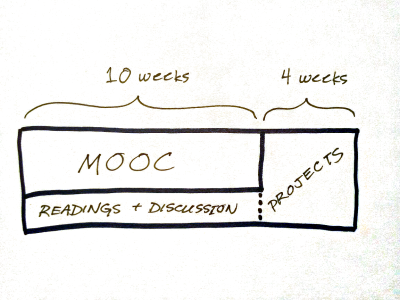Who Are Our Students? Bridging Local and Global Learning Communities #ELIFocus
Earlier this week I gave a short presentation as part of the EDUCAUSE Learning Initiative’s spring online focus session on MOOCs (massive open online courses). I was asked to talk about some of the ways that Vanderbilt is weaving open education into campus practice. We’re in the early days of such things, but I managed to share a few examples that I thought were interesting. I offer a brief recap here on the blog. First, my slides:
The first example I shared was by far the most interesting one to the focus session participants, given the questions I received about it. Vanderbilt computer science professor Doug Fisher experimented last fall with “wrapping” a course around a MOOC. He had students in his graduate-level machine learning course complete a MOOC on machine learning offered by Stanford University. The students watched the lecture videos and completed the online assignments, while also working through additional readings provided by Doug and meeting once a week as a class for discussion. That was the first ten weeks of the semester; for the final four weeks, the students worked on projects under Doug’s supervision.
You can read a few of Doug’s thoughts on this experiment in his November 2012 ProfHacker blog post. I worked with a couple of graduate students to study his students’ experiences in this flipped classroom, using a focus group and a post-course survey to explore their perceptions of the course. Hopefully, we’ll have a paper reporting our results coming out this summer, but for now, I’ll note that the students were very positive about the “wrapper” approach. They found the online component of the course well-structured and easy to use, although they didn’t participate much in the discussion forums. They noted that Doug’s role in the course was different; he was more of a “facilitator” than lecturer, to use their word. The main challenge in the course was integrating the introductory material covered in the MOOC with the more advanced material Doug provided them through the additional readings. Doug found using a MOOC as a “super-textbook” of sorts was more challenging than using a more traditional textbook.
During my focus session presentation, I also described some of the meetups that our Coursera faculty have been arranging. We have now held both on-campus meetups for Coursera students in the Nashville area to meet our faculty and each other, as well as virtual office hours streamed over the Internet for non-local students. We’ve also combined these two a few times, with the professor fielding questions from both local students in the room and distant students participating via chat. The ability to connect local students (Vanderbilt undergrads, Vanderbilt faculty and staff, students from the Nashville community) with the global community of learners in a MOOC is pretty amazing, but, as I said above, we’re in the early days of figuring out ways to leverage this ability.
I also pointed out that Vanderbilt’s Coursera initiative has provided our undergraduate and graduate students some unique and valuable professional development opportunities. We have students working as teaching assistants for our online courses and contributing to both qualitative and quantitative research projects exploring online education. For our graduate students planning faculty careers, these experiences are particularly valuable, given the growing importance of online education (open or otherwise) in higher education. Every time I’ve asked a graduate student to be involved in our Coursera initiative, I’ve been met with enthusiasm. Our students know this is important work!
To end my presentation, I noted that we now have about 170,000 more students in the Vanderbilt community with the launch of our five MOOCs on the Coursera platform. These aren’t tuition-paying, credit-earning students, so it may be tempting to think they don’t “count.” But Vanderbilt already offers a number of non-credit educational programs for the Nashville community, from the Osher Lifelong Learning Institute for seniors to the art classes offered by Sarratt Studio to our Thinking Out of the (Lunch) Box series of lectures at the Nashville public library to the Vanderbilt School for Science and Math, which brings talented high school students to campus every week of the semester. One can see our open online courses as a new way to fulfill Vanderbilt’s educational mission, reaching a massive number of students around the world.
I also argued that Rockwell should be the official font of MOOCs. It’s massive!
